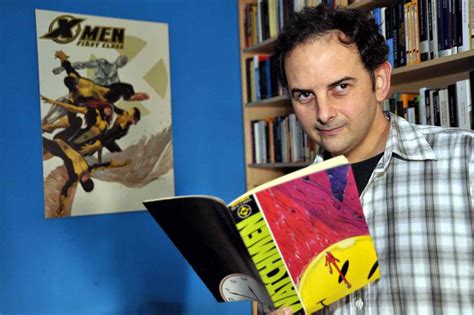A Quote by Félix J. Palma
True literature should rouse the reader, unsettle him, change his view of the world, give him a resolute push over the cliff of self-knowledge
Related Quotes
When you approach your baby with an attitude of respect, you let him know what you intend to do and give him a chance to respond. You assume he is competent and involve him in his care and let him, as much as possible, solve his own problems. You give him plenty of physical freedom and you don't push development.
Christ and the life of Christ is at this moment inspiring the literature of the world as never before, and raising it up a witness against waste and want and war. It may confess Him, as in Tolstoi's work it does, or it may deny Him, but it cannot exclude Him; and in the degree that it ignores His spirit, modern literature is artistically inferior. In other words, all good literature is now Christmas literature.
Take a Nicodemus and put a Joseph Smith's spirit in him, and what do you have? Take a Da Vinci or a Michelangelo or a Shakespeare and give him a total knowledge of the plan of salvation of God and personal revelation and cleanse him and take a look at the statues he will carve and the murals he will paint and the masterpieves he will produce. Take a handel with his purposeful effort, his superb talent, his earnest desire to properly depict the story, and give him inward vision of the whole true story and revelation, and what a master you will have!
The storyteller and poet of our time, as in any other time, must be an entertainer of the spirit in the full sense of the word, not just a preacher of social or political ideals. There is no paradise for bored readers and no excuse for tedious literature that does not intrigue the reader, uplift him, give him the joy and the escape that true art always grants.
There was a tale he had read once, long ago, as a small boy: the story of a traveler who had slipped down a cliff, with man-eating tigers above him and a lethal fall below him, who managed to stop his fall halfway down the side of the cliff, holding on for dear life. There was a clump of strawberries beside him, and certain death above him and below. What should he do? went the question. And the reply was, Eat the strawberries. The story had never made sense to him as a boy. It did now.
The analytical writer observes the reader as he is; accordingly, he makes his calculation, sets his machine to make the appropriate effect on him. The synthetic writer constructs and creates his own reader; he does not imagine him as resting and dead, but lively and advancing toward him. He makes that which he had invented gradually take shape before the reader's eyes, or he tempts him to do the inventing for himself. He does not want to make a particular effect on him, but rather enters into a solemn relationship of innermost symphilosophy or sympoetry.
What men and women need is encouragement. Their natural resisting powers should be strengthened, not weakened ... Instead of always harping on a man's faults, tell him of his virtues. Try to pull him out of his rut ... Hold up to him his better self, his real self that can dare and do and win out! ... People radiate what is in their minds and in their hearts.
No man could bring himself to reveal his true character, and, above all, his true limitations as a citizen and a Christian, his true meannesses, his true imbecilities, to his friends, or even to his wife. Honest autobiography is therefore a contradiction in terms: the moment a man considers himself, even in petto, he tries to gild and fresco himself. Thus a man's wife, however realistic her view of him, always flatters him in the end, for the worst she sees in him is appreciably better, by the time she sees it, than what is actually there.
The musical flags of the world should fly at half mast because truly one of the greatest guitarists in the world and king of the blues has died. I have cherished him and so has the rest of the world who knew him and loved him for his entire career. As we pain, we must celebrate that his music, his style of playing and singing will last forever, from the recordings that he has done and the influence that he has had and will have on guitarists all over this planet. Long live the spirit of B.B. King.
Kissinger projects a strong impression of a man at home in the world and on top of his brief. But there are a number of occasions when it suits him to pose as a sort of Candide: naive, and ill-prepared for and easily unhorsed by events. No doubt this pose costs him something in point of self-esteem. It is a pose, furthermore, which he often adopts at precisely the time when the record shows him to be knowledgeable, and when knowledge or foreknowledge would also confront him with charges of responsibility or complicity.





































